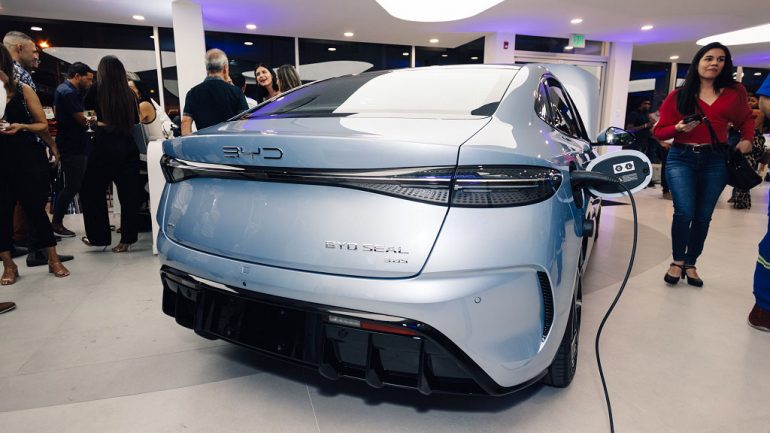Automakers View Potential for Low-Price Chinese language EVs in US from Mexico as Menace : Automotive Addicts
Automotive

The American auto business is more and more apprehensive a couple of potential inflow of low-cost electrical autos (EVs) from China, facilitated by way of manufacturing operations in Mexico. Leveraging the North American commerce agreements, Chinese language automakers may flood the U.S. market with these reasonably priced EVs, posing a major menace to home producers.
At present, the typical value of an American-made EV stands at roughly $55,000, which is sort of double the price of Chinese language EVs. This stark value disparity may lead to important market disruption. As a consequence, U.S. EV producers may wrestle to compete, doubtlessly resulting in manufacturing unit closures and job losses throughout the American industrial heartland. This state of affairs echoes previous situations the place Chinese language government-subsidized merchandise, corresponding to metal and photo voltaic gear, severely impacted American industries.
Senator Sherrod Brown of Ohio has voiced sturdy opposition to this potential menace, calling for a ban on Chinese language EVs within the U.S. He emphasised the historic sample of China dumping sponsored items into international markets to undercut home industries. The Alliance for American Manufacturing has equally warned that the arrival of low-cost Chinese language EVs could possibly be an “extinction-level occasion” for the U.S. auto sector.
The commerce framework enabling this potential inflow is the U.S.-Mexico-Canada Settlement (USMCA), enacted in 2020. Underneath this settlement, autos assembled in Mexico can enter the U.S. both duty-free or at a minimal tariff fee. This provision may permit Chinese language EVs to enter the U.S. at considerably decrease costs in comparison with home fashions.
To counter this menace, the U.S. has a number of choices. Customs officers may rule that Chinese language EVs assembled in Mexico don’t qualify for duty-free advantages. Alternatively, the U.S. may stress Mexico to exclude Chinese language autos or invoke nationwide safety considerations to bar these EVs from getting into the U.S.
Former President Donald Trump has proposed a 100% tariff on Chinese language EVs to guard American producers. Nevertheless, any authorities measures to limit Chinese language EV imports would probably face authorized challenges from corporations looking for to learn from the decrease costs.
The timing of this menace is especially problematic for U.S. automakers, who’re already grappling with gradual EV gross sales regardless of important investments. Excessive costs and considerations about charging infrastructure have dampened client enthusiasm for EVs within the U.S. However, some specialists argue that the provision of low-cost Chinese language EVs may enhance general EV adoption and funding in vital infrastructure.
China at present leads the worldwide EV market, producing almost 62% of the world’s battery-powered EVs. The U.S., by comparability, accounts for lower than 10%. Chinese language automakers like BYD have achieved price efficiencies by way of substantial authorities subsidies, permitting them to supply competitively priced fashions such because the $12,000 Seagull.
U.S. policymakers and automakers stay cautious concerning the aggressive edge Chinese language EVs may need, citing quicker growth cycles and important authorities assist. Ford Motor’s CFO John Lawler has highlighted the aggressive menace posed by Chinese language EV producers, who can develop new fashions a lot faster than their U.S. counterparts.
The U.S. has responded with measures to curb the inflow of Chinese language EVs, corresponding to elevating tariffs to 102.5%. Nevertheless, the USMCA complicates this effort by doubtlessly permitting Chinese language EVs assembled in Mexico to bypass these tariffs. Assembly the settlement’s necessities, corresponding to sourcing 75% of components from North America and guaranteeing sure labor requirements, stays a problem for a lot of automakers, together with Chinese language ones.
Commerce specialists recommend that blocking Chinese language EVs on nationwide safety grounds could possibly be the simplest technique. Issues concerning the potential for these autos for use for espionage or different safety dangers have been raised, with President Biden ordering investigations into the know-how utilized in Chinese language good automobiles.
Finally, the U.S. might leverage its important affect over Mexico, its major export market, to forestall Chinese language EV investments. Moreover, the upcoming overview of the USMCA in 2026 supplies a chance to barter new phrases that might additional prohibit Chinese language EVs.
On this evolving panorama, the way forward for the U.S. auto business and its capacity to compete within the international EV market stay unsure. The decision of those commerce and safety points will considerably influence the trajectory of EV adoption and manufacturing in America.
Supply: Related Press
FOLLOW US TODAY:






